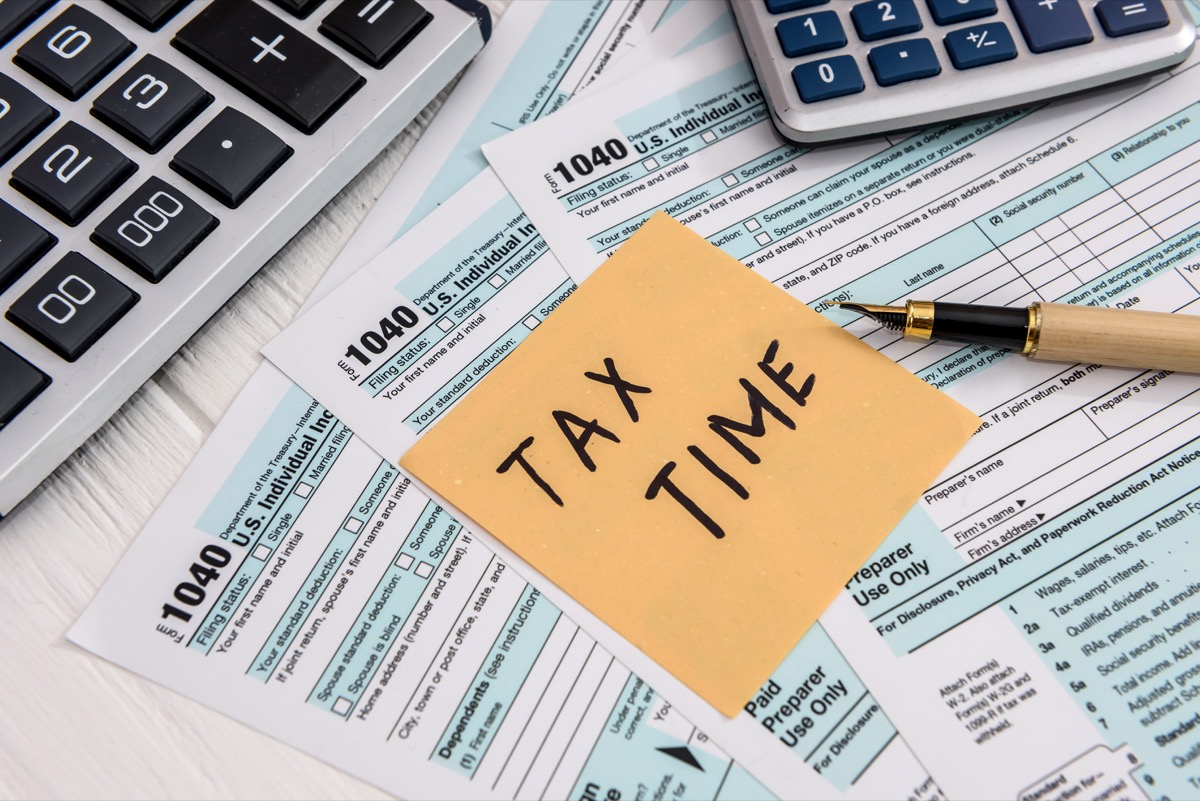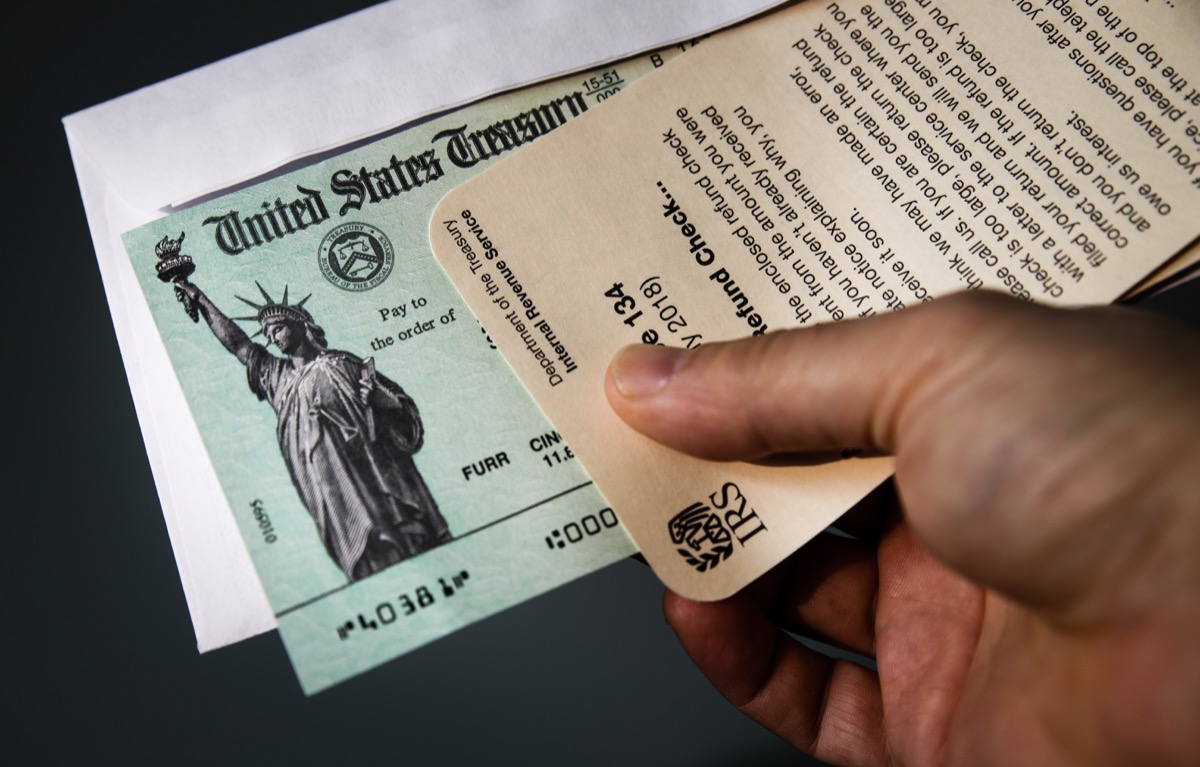If You’re Waiting on a Stimulus Check, Read This Before Filing Your Taxes

Tax season is already upon us, and while doing your taxes is generally stressful, that stimulus check (or three) you might have gotten in the last year has only added to the confusion. In the spring of last year, the first stimulus checks for $1,200 were sent out and then a few months ago, second checks for $600 went out. Now, many are receiving a third stimulus payment for $1,400 amid tax season, which just adds to the headache that is filing your tax return.
Fortunately, the IRS is expected to push back the tax-filing deadline from April 15 to May 15 this year, according to The Washington Post. This will give you an extra month to figure out exactly how to file your taxes this year. Talking to financial experts, we’ve broken down everything you need to know before filing your taxes in order to receive the full refund you deserve from these stimulus payments. Read on to find out what they said, and for more stimulus guidance, Your Stimulus Check May Never Come If You Don’t Do This, IRS Says.
Depending on your current salary, you may want to file your taxes as soon as possible, or you may have reason to wait.

The IRS has said it will look at your most recent tax return to determine if you are eligible for the third stimulus payment—so either your 2019 return or your 2020 return, depending on how soon you file this year. And as Kari Brummond, a tax preparer and accounting writer for TaxDebtHelp, explains, if your income decreased from 2019 to 2020 or you had a child, you may benefit from filing as soon as possible because you may be eligible for more money based on your 2020 tax return.
However, for those whose income increased from 2019 to 2020, you may want to wait to file as this increase may push you over the eligibility requirements, forcing you to forgo a third stimulus check.
“In a nutshell, taxpayers who earned less in 2020 than 2019 may want to file as soon as possible. Those who earned less in 2019 than 2020 may want to wait to file their tax returns until they have received their stimulus checks,” Brummond explains. And for information on stimulus delays, If You Haven’t Received Your Stimulus Payment Yet, You Need To Check This.
Eligibility requirements for the third stimulus are different from the first two.

Eligibility requirements for the third stimulus payment are different from those for the first two. According to The New York Times, President Joe Biden agreed to stricter income limits in order to pass the third stimulus bill through the Senate. This set income caps at $80,000 for individuals, $120,000 for single parents, and $160,000 for joint-filers—which is $20,000 lower than the income caps were for the last stimulus payments. If it is indicated that you make more than these limits on your latest tax return, you won’t receive the third stimulus check. And for more on this third payment, This One Thing Will Be Missing From Your Next Stimulus Check.
You can still qualify for previous stimulus payments if your financial situation has changed.

For the first and second stimulus checks, the government looked at your 2018 or 2019 tax return to determine if you met the qualifications necessary to receive a payment, Brummond explains. For these first two payments, you were eligible for a full payment if you earned up to $75,000 a year as a single filer or up to $150,000 a year as joint filers.
However, if your financial situation changed in 2020, you may have fallen below the income threshold that you surpassed in 2018 or 2019. So while you actually ended up qualifying for these stimulus payments in 2020, you may not have received them, since payments were based on your previous 2018 or 2019 returns. If this describes your situation, according to Brummond, you still can receive previous stimulus payments by applying for the Recovery Rebate Credit on your 2020 tax return, which will be “solely based on your 2020 income.”
“Common reasons why taxpayers may claim a recovery rebate credit include reduced income in 2020, a change in marital filing status, a change in the number of dependents,” Tax Adviser explains on their website. And for more up-to-date information, sign up for our daily newsletter.
You can also collect missed or reduced stimulus payments via your 2020 tax return.

Even people who did qualify for the first and second stimulus checks based on their 2018 or 2019 tax returns may have ended up not receiving their payments. Rus Garofalo, founder of Brass Taxes, says filing for a Recovery Rebate Credit can also help you get these missed payments, which “can be added to your taxes to increase your refund or decrease what you owe.”
If you made more than $75,000 ($150,000 for joint filers) but less than $99,000 ($198,000 for joint filers), you were still eligible to receive a partial payment from the first stimulus package. Individuals earning up to $87,000 and joint filers earning up to $174,000 also still qualified for partial payments from the second stimulus.
So if your income decreased in 2020, you may be eligible to receive more money based off of these income requirements, even if you already received a partial payment. However, if you somehow received more money than you were supposed to for either stimulus payment, you “won’t have to pay it back,” assures Mike Savage, chief executive officer of 1-800Accountant. And for more on previous stimulus payments, If You Never Got Your Last Stimulus Check, Experts Say Do This Now.
You don’t have to wait for the third stimulus payment to file your taxes in general.

Deciding when to file your taxes is a personal choice, experts say. But no matter what, you don’t have to wait to file your tax return just because you may be waiting on a third stimulus check. According to Ben Reynolds, chief executive officer and founder of Sure Dividend, “You don’t need to include any information on a third stimulus when you file for your 2020 taxes.” Instead, these stimulus payments will go on your 2021 taxes next year. And much like the last two stimulus payments, you may be able to receive a Recovery Rebate Credit when filing for your 2021 taxes if your income or dependents significantly changed from 2020 to 2021, Reynolds explains. And for more recent stimulus news, If You’ve Done This in the Past Year, Your Stimulus Check Could Be Delayed.